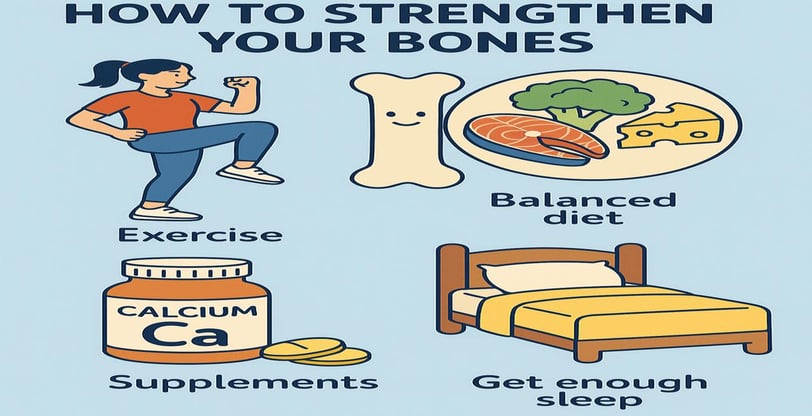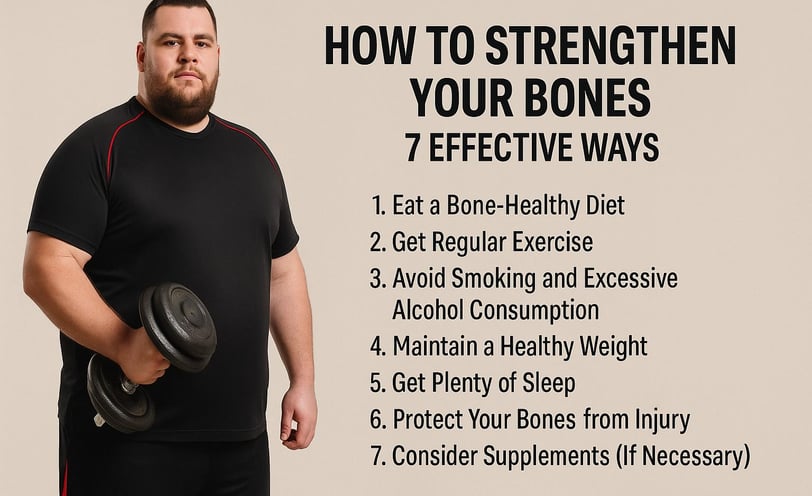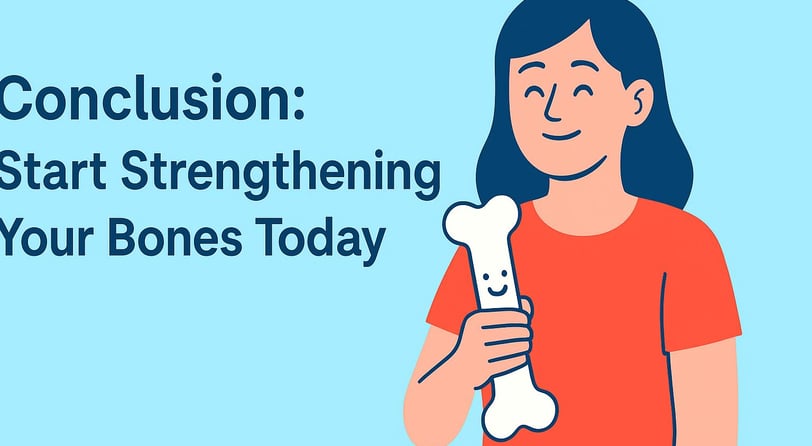How to Strengthen Your Bones (and Why It Matters More Than You Think)
Strong bones are the foundation of a healthy, active life—but many people overlook bone health until it's too late. In this blog post, you'll learn why taking care of your bones is essential at every age and discover easy, effective ways to build and maintain bone strength. From nutrition and exercise to lifestyle tips and prevention strategies, this guide will help you protect your bones and reduce the risk of fractures and osteoporosis. Start building better bones today!
WELLNESS
James B
6/4/20256 min read
How to Strengthen Your Bones (and Why You Should)
Your bones are more than just the structural framework that supports your body. They are living tissues that undergo constant change, growing, breaking down, and rebuilding throughout your life. Strong bones are essential not only for supporting your body but also for preventing conditions like osteoporosis, fractures, and other bone-related issues. Strengthening your bones is something everyone should focus on—no matter your age—since bone health can affect your overall well-being.
In this guide, we will explore why bone health is so important, how to strengthen your bones, and simple lifestyle changes you can make to ensure your bones stay strong and healthy for years to come.
Why Should You Focus on Bone Health?
Your bones are the foundation of your body, and they serve many important functions. Here are some reasons why it’s essential to maintain strong bones:
Prevents Fractures and Breaks
One of the most obvious reasons for strengthening bones is to reduce the risk of fractures. Bone density naturally decreases with age, especially after the age of 30. When your bones are weak, even a minor fall or bump can result in fractures.Reduces the Risk of Osteoporosis
Osteoporosis is a condition where bones become brittle and fragile due to a decrease in bone mass. It makes bones more prone to fractures, especially in the hips, spine, and wrists. Osteoporosis affects millions of people, particularly older adults, and can severely impact the quality of life. Strengthening your bones early can help prevent this condition.Supports Mobility and Posture
Healthy bones help keep your posture aligned and enable you to move freely. Strong bones are critical for balance and mobility, which are essential for everyday tasks and overall fitness.Improves Overall Health
Bone health is linked to overall health. Strong bones help support muscles and joints, which in turn allows for better movement. Maintaining bone health can contribute to improved balance, muscle mass, and joint flexibility.Prevents Bone Loss in Older Age
As you age, bone density naturally decreases, which is why it’s essential to take steps to strengthen bones earlier in life. Building strong bones in your younger years provides a solid foundation for later life, reducing the risk of age-related bone loss.
How to Strengthen Your Bones: 7 Effective Ways
Now that we understand why bone health is so important, let’s dive into how to strengthen your bones with simple lifestyle changes. The good news is that strengthening your bones doesn’t require complicated procedures or a massive overhaul of your daily habits. By making small, consistent changes, you can significantly improve your bone health.
1. Eat a Bone-Healthy Diet
One of the most important factors in bone health is nutrition. What you eat plays a significant role in building and maintaining strong bones. Here are some of the most essential nutrients for bone strength:
Calcium
Calcium is the building block of your bones. It’s crucial for maintaining bone density and strength. Adults need around 1,000 milligrams of calcium per day, and women over 50 and men over 70 need 1,200 milligrams. Dairy products like milk, yogurt, and cheese are excellent sources of calcium. However, if you're lactose intolerant or prefer plant-based options, try fortified plant milks (almond, soy, oat), leafy green vegetables (kale, broccoli), tofu, and almonds.Vitamin D
Vitamin D helps your body absorb calcium. Without sufficient vitamin D, your body can’t properly absorb calcium, which affects bone health. The recommended daily intake of vitamin D for most adults is 600 IU, increasing to 800 IU for individuals over 70. Sunlight is one of the best natural sources of vitamin D, but you can also get it from foods like fatty fish (salmon, mackerel), egg yolks, and fortified foods such as cereals, milk, and orange juice.Magnesium
Magnesium is essential for bone health because it helps regulate calcium levels in the body. Foods like nuts, seeds, whole grains, leafy greens, and legumes are great sources of magnesium.Vitamin K
Vitamin K plays a vital role in bone metabolism and helps regulate calcium. You can find it in foods like green leafy vegetables (spinach, kale), broccoli, and Brussels sprouts.Protein
Your bones need protein for strength and structure. Bone matrix—the tissue that forms the structure of bones—contains collagen, a protein that is essential for keeping bones strong. Eating adequate protein through sources like lean meats, fish, beans, and legumes supports bone structure.
2. Get Regular Exercise
Physical activity is one of the best ways to strengthen your bones. Exercise not only builds muscle, which supports your bones, but it also helps maintain bone density. There are two main types of exercise that can specifically strengthen bones:
Weight-Bearing Exercises
These exercises involve moving against gravity, which places stress on your bones, prompting them to become stronger. Examples include walking, running, hiking, dancing, and climbing stairs. Weight-bearing exercises are excellent for improving bone strength and density.Strength Training
Lifting weights or doing resistance exercises like squats, lunges, or push-ups can help stimulate bone growth by increasing the mechanical load on your bones. This type of exercise is especially important for maintaining bone density as you age.
Regular exercise not only strengthens bones but also supports joint health and muscle mass, which is important for preventing falls and injuries.
3. Avoid Smoking and Excessive Alcohol Consumption
Both smoking and excessive alcohol intake are harmful to bone health. Smoking can reduce bone density and interfere with the body’s ability to absorb calcium. It also affects blood circulation, which is vital for bone growth and repair. If you smoke, quitting can significantly improve your bone health.
Alcohol, when consumed in excess, can have a similar negative effect on bones. It interferes with the body's ability to absorb calcium and may affect bone-forming cells, leading to weakened bones. Limiting alcohol intake and avoiding smoking are critical steps in maintaining bone strength.
4. Maintain a Healthy Weight
Maintaining a healthy weight is important for bone health. Being underweight increases the risk of bone loss and fractures, while being overweight can put excessive stress on your joints and bones, particularly those in the hips, knees, and spine. Achieving a balanced, healthy weight through a combination of proper nutrition and exercise can help keep your bones in good condition.
5. Get Plenty of Sleep
Sleep is crucial for overall health, and it plays a role in maintaining healthy bones as well. During sleep, your body repairs itself, and that includes bone tissue. Chronic sleep deprivation can affect hormone levels, including those responsible for bone formation. Aim for 7-9 hours of quality sleep each night to support your body’s natural healing processes, including maintaining strong bones.
6. Protect Your Bones from Injury
Accidents happen, but you can take steps to minimize the risk of injury to your bones. Protecting yourself from falls and injuries is essential for maintaining bone health, especially as you age. Here are a few tips:
Wear proper footwear: Choose shoes that are supportive and have a non-slip sole.
Install safety measures: Add handrails and non-slip mats in areas like bathrooms and stairways.
Be cautious when engaging in physical activity: If you’re doing high-impact exercises, always warm up and stretch properly to avoid strain or injury.
7. Consider Supplements (If Necessary)
While it's best to get your nutrients from food, some people may need supplements to strengthen their bones. Calcium and vitamin D supplements are commonly recommended for individuals who are not getting enough through their diet. Before taking any supplements, it’s important to consult with your healthcare provider to determine the right dosage and to ensure you’re meeting your bone health needs.
Additional Tips for Maintaining Bone Health
Limit Caffeine and Soda: Excessive caffeine and sugary soda can interfere with calcium absorption. Try to limit your intake of these beverages to maintain bone health.
Stay Hydrated: Drinking plenty of water is important for maintaining overall health, including bone health.
Consider Bone Density Testing: If you’re concerned about your bone health or are at risk of osteoporosis, a bone density test can help determine how strong your bones are. Your doctor can recommend appropriate steps based on the results.
Conclusion: Start Strengthening Your Bones Today
Maintaining strong bones is crucial for a healthy, active life. By focusing on bone-healthy foods, staying active with weight-bearing and strength exercises, and making lifestyle changes, you can improve your bone density and reduce your risk of fractures and osteoporosis.
Remember, it’s never too early or too late to start taking care of your bones. Strengthening your bones today will provide a solid foundation for a healthier tomorrow. So, take small steps now—whether it’s eating more calcium-rich foods, going for a walk, or quitting smoking—and you’ll be building strong bones for life!







